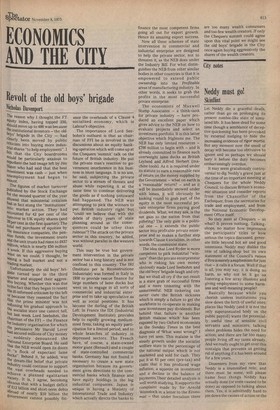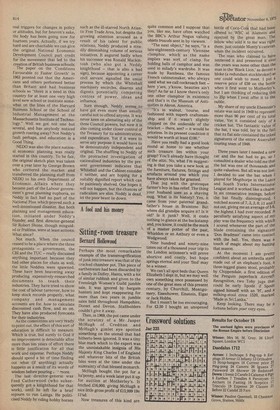City notes
Neddy must go!
Skinflint
Let Neddy die a graceful death, rather than go on prolonging its present zombie-like state of simu lated life. It has been dead for some time though a semblance of decep tive quickening has been provoked by external nudging to hide the increasing evidence of rigor mortis. But any moment now the smell of decay will become too obtrusive to ignore and so perhaps we should bury it before the duty becomes embarrassingly overdue.
It may seem gratuitously controversial to dig Neddy's grave just at the time of an important meeting at Chequers for the whole Neddy Council, to discuss Britain's economic situation and consider reports from the Chancellor of the Exchequer, from the secretaries for trade and employment, and from the National Economic Development Office itself.
So they meet at Chequers — so what? It proves nothing. Talkingshops, no matter how impressive the participants' titles or how serious the topics discussed, generate little beyond hot air and good intentions. Neddy may dislike the title of talking-shop but its own statement of the Council's raison d'être is merely a euphemism for just that — it calls it a forum. Well if that is all, you may say, it is doing no harm, so why not let it go on fostering a few stray illusions and giving employment to some harmless and well-meaning people?
Basically because while you cherish useless institutions you slow down the birth of useful ones; places like Neddy (and it is not the only superannuated body on the public payroll) waste the potentially useful time of sensible civil servants and ministers; talking about problems hides the need for action; and there are far too many 'people living off my taxes already. And we really ought to get over this nostalgia that prevents us getting rid of anything if it has been around fOr a few years.
Dissenters from my view that Neddy is a mummified relic, and there must be some, will please name four things Neddy has actually done (or even caused to be done) as opposed to talking about them. Yes, it is admittedly hard to pin down the causes of action or the real triggers for changes in policy or attitudes, but for heaven's sake, the body has been going now for fourteen years. Actually, if we try hard and are charitable we can give the original National Economic Development Council part credit for the movement that led to the creation of British business schools.
The paper on the 'Conditions Favourable to Faster Growth' in 1963 pointed out that the Ameri cans and others performed better than Britain and had business schools so "there is a need in this country for at least one very high level new school or institute some what on the lines of the Harvard Business School or the School of Industrial Management at the Massachusetts Institute of Technology." Well we got not one but several, and has anybody noticed growth roaring away? Not Neddy's fault perhaps, and education is a Good Thing.
• NEDO was also the place national economic planning was really started in this country. To be fair, the original sketch plan was taken over a year later by George Brown who cornered the market and transferred the planning staff from NEDO to his own Department of Economic Affairs where they became part of the Labour government's great planning euphoria, so Neddy in fact had no part of the National Plan which proved such a well-intentioned disaster. But both planning and management education, initiated under Neddy's founder and first director-general Sir Robert Shone, though misguided or fruitless, were at least actions. What since?
Not much. When the . council ceased to be a place where the three protagonists — government, the CBI and the TUC — really discussed anything important because they had other places for chats as well, the little Neddies were spawned. These have been beavering away producing expensively-researched documents to teach their industries. They have tried to show the cost of labour turnover, how to keep stock records properly, what company and management accounts are for, how to calculate discounted cash flow, and so on. They have also produced forecasts.
for their industries. As the committees are very ready to point out, the effect of this sort of education is difficult to measure. Which is true, but surely to God if no improvement is detectable after more than ten years of effort there is little justification for all that work and expense. Perhaps Neddy should spend a bit of time finding out what (if anything) actually happens as a result of its words of wisdom before pouring more.
The last director-general was Fred Catherwood (who subsequently got a knighthood for that work), until he left for a brief sojourn to run Laings. He politicised Neddy by riding hobby horses
such as the ill-starred North Atlantic Free Trade Area, but despite the growing attention aroused as a result of his talent for public relations, Neddy produced a steadily diminishing volume of serious initiatives. It augured badly when his successor was Ronald Mackintosh (who also got a Neddy knighthood — that is also a bad sign), because appointing a career civil servant signalled the usual process by which the Whitehall machinery encircles, disarms and digests potentially competing centres of power, ideas and influence.
Sure enough, Neddy seems. to have got even more than usually careful not to offend anyone. It was never keen on alienating any of the three Council powers, but now it is also coming under closer control of the Treasury for its administration, and expenditure. Yet if it were to serve any purpose it would have to be demonstrably independent and original. The shuffling to Neddy of the protracted investigation of nationalised industries by the present government indicates that Whitehall and the Cabinet consider it neither, and are hoping for a suitably dignified report which can be painlessly shelved. One hopes it will not happen, but the chances of radicalism are slim. Neddy is dead, let the poor beast lie down.

































 Previous page
Previous page